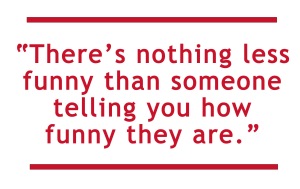 In this guest post, Cat Girl’s Day Off and Sucks to Be Me author Kimberly Pauley offers some advice for authors who want to write
In this guest post, Cat Girl’s Day Off and Sucks to Be Me author Kimberly Pauley offers some advice for authors who want to write ![]() humor. Her books have been called “entertaining, hilarious, and exceptionally creative,” (School Library Journal) and been praised for their “pitch-perfect humor” (Booklist).
humor. Her books have been called “entertaining, hilarious, and exceptionally creative,” (School Library Journal) and been praised for their “pitch-perfect humor” (Booklist).
My son is five and he’s (obviously) a boy. That means he finds slapstick humor absolutely jaw-droppingly hilarious. Tom and Jerry make him laugh so hard that he will literally fall out of his chair. My husband has (mostly) outgrown that style of humor, however, and tends to laugh at more intellectual Eddie Izzard-style jokes. That’s the great thing about humor-it’s not all one-size-fits all. Different things make different people laugh. So how do you write a funny story to appeal to more than just yourself?
 First off, know your audience. While not everyone is the same (thank goodness), there are some pretty major differences between a 45-year-old stock broker and a twelve year old girl. Humor has to be relatable and include elements that are recognizable for the intended audience.
First off, know your audience. While not everyone is the same (thank goodness), there are some pretty major differences between a 45-year-old stock broker and a twelve year old girl. Humor has to be relatable and include elements that are recognizable for the intended audience.
This might seem obvious, but it can be hard. I’m mumble-something-mumble years old. I was a teen in the 80’s (you can do the math if you like). A joke about parachute pants might fly with me (or, it would have back then-I mean, come on, how were those ever considered cool?) but today’s teens would have no idea what I was talking about (I hope). In fact, that 45-year-old stockbroker would get more of a giggle out of it. Make your humor relevant for the audience you’re writing for.
And be specific. The more specific you are, the funnier things are, partly because it makes it easier for people to imagine what’s going on. If you say “yappy Yorkshire Terrier wearing a studded leather collar and a Yo Mamma! doggy t-shirt,” that’s funnier than “little dog.”
But for heaven’s sake, don’t force a joke or over complicate things. If it takes pages and pages to set up the payoff, chances are your  readers are going to give up or forget what was going on before they get there. Or they will figure out the punch line before you have a chance to deliver it, robbing your words of their impact. Let the humor come naturally out of the situation or plot twist or character. In Cat Girl’s Day Off, I had an easy time of it – there’s something intrinsically funny (to most people) about a talking pink cat with attitude named Rufus Brutus the Third.
readers are going to give up or forget what was going on before they get there. Or they will figure out the punch line before you have a chance to deliver it, robbing your words of their impact. Let the humor come naturally out of the situation or plot twist or character. In Cat Girl’s Day Off, I had an easy time of it – there’s something intrinsically funny (to most people) about a talking pink cat with attitude named Rufus Brutus the Third.
At the same time, you don’t want to shove your reader’s face into your storytelling pie (that’s the kind of thing that’s funny to watch but not so pleasant to experience). There’s nothing less funny than someone telling you how funny they are and telling, telling, telling you instead of showing you. Huh-hey, that old “show don’t tell” thing works for so many different things in writing, doesn’t it?
And that brings me to my final point -the biggest secret to successful humor writing is…surprise. Yep, that’s right. The unexpected will get them every time. When you open that door and the reader expects one thing and gets another…you’ve got them. Charlie Chaplin knew that. Heck, even Aristotle knew it.
Learn more about Cat Girl’s Day Off and read the first three chapters.


One thought on “How to Write Humor for Young Readers”
Comments are closed.